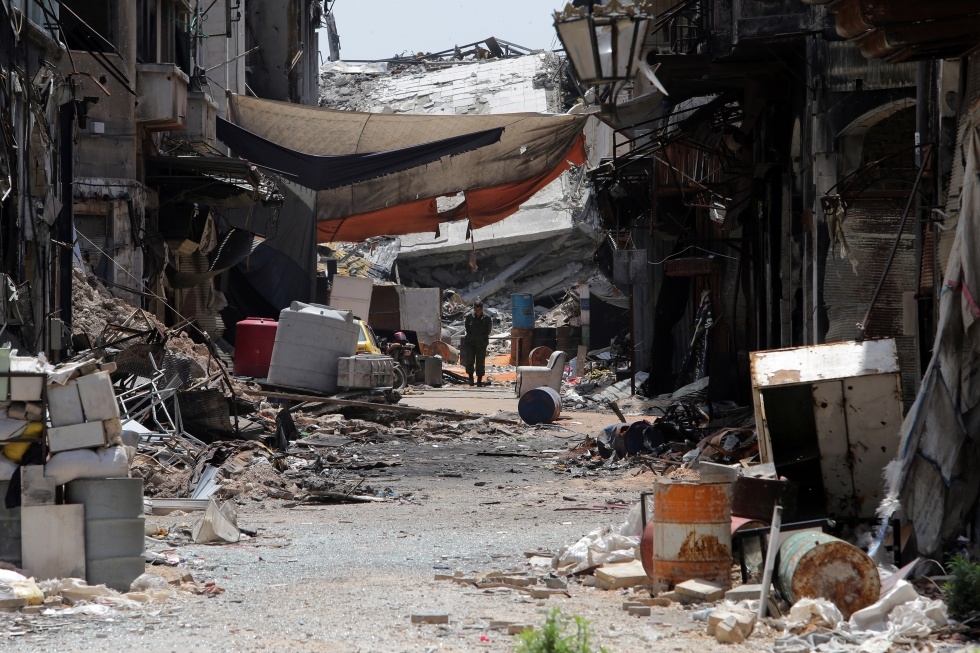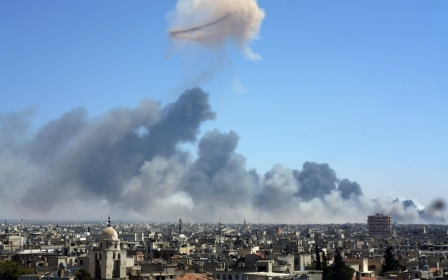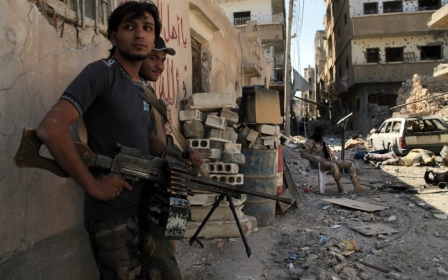Brother and sister survive siege of Syria's Homs

By Rana Moussaoui
HOMS, Syria - Antoinette Fares lost nearly half her weight during the hellish siege she and her brother Sobei endured in Homs' Old City because they didn't want to be a burden to relatives.
Before the army blockaded the area two years ago, she weighed 77 kilos (170 pounds), but she is now down to only 45.
"I took in my clothes myself," the 66-year-old told AFP, pointing to her tracksuit with a sad smile on her tired face.
Sobei, aged 66, lost 27 kilos as they hung on in the Christian district of Bustan al-Diwan, where the stairs leading to their dim apartment are crowded with boxes and water cans.
New MEE newsletter: Jerusalem Dispatch
Sign up to get the latest insights and analysis on Israel-Palestine, alongside Turkey Unpacked and other MEE newsletters
Cloistered in their home despite daily bombardment and raging battles, the siblings rode out the siege until its bitter end last week, when the last rebels left under a deal with the government.
A UN-brokered deal in February led to hundreds of civilians being evacuated, but Antoinette and Sobei insisted on staying put.
Then last week, some 2,000 people, most of them rebels, were the last to leave the siege. Sobei and Antoinette stayed behind, and watched how the army retook control.
'I wanted to die at home'
The two spent the entire siege sleeping in their living room, because the bedroom dangerously overlooked the street.
"I wanted to die at home," says Antoinette, from whose house soldiers could be seen taking the rebels' place.
She and Sobei spoke with dignity, despite the hardship they endured.
"We didn't want to be a burden, not even for our loved ones. We preferred to stay at home," said Sobei.
Like thousands of others during the siege, they survived on supplies of wheat, rice and bulgur, supplemented by tomatoes and parsley that they planted in pots in the corridor outside the flat.
But, after most of the civilians left in February, life reached its worse.
"We would pick weeds growing on the streets, and we would mix them with bulgur. We would eat that three times a day," said Antoinette, for whom meat had become a distant dream.
Starving rebels from another neighbourhood, also under siege, twice stole their provisions of fat, wheat and oil.
"We had hidden them behind wooden planks, but they still found them," said Sobei.
A carpenter, he was proud to show off the techniques he used to heat tea and coffee.
He would dip a swab of cotton in arak (a traditional Levantine anise-based alcoholic drink) and light it to make a small fire.
He also made candles from blocks of red wax he had stored up from the start of the revolt against President Bashar al-Assad three years ago.
After three years without running water, supply was restored to the neighbourhood on Sunday, after the last rebels had withdrawn to the north of Homs province.
During the siege, rebels in their neighbourhood would bring them water from the well, which they would boil on a makeshift stove they'd keep burning with branches collected from the streets.
Despite being holed for two years, Antoinette and Sobei did not communicate much with the rebels.
"We'd just say good morning and good evening to each other," said Sobei.
Cut off from the world, without electricity or telephones, the two suddenly saw the rebels packing up their belongings and their guns.
"Several of them asked me whether I had a suitcase or a bag so they could pack their stuff and take it with them," Antoinette said, "but I didn't."
Then civilians displaced by violence more than two years earlier started trickling back into the neighbourhood, and the siblings were reunited with their sister, whom they hadn't seen throughout the siege.
"It was very emotional... She had grown older," said Antoinette, as she nervously played with her thin greying hair. Her eyes brimmed with tears, as her voice cracked with emotion.
'Not yet normal'
Antoinette is a smoker and had no cigarettes for more than a year. As she puffs on one now, she clearly enjoys every moment.
"I haven't yet managed to realise what we've gone through," she said.
A little bell hanging in their living room rings, announcing a visit by Antoinette and Sobei's nephew and his wife, whom they had not seen since June 2012.
The two women embrace each other emotionally, as Antoinette weeps again. She then serves coffee and arranges two little plants decorating the table.
One of the plants is decorated with plastic Easter eggs, while the other has red ribbons.
"We've passed this test, but nothing yet feels normal," says Antoinette, who suffers from insomnia.
"It will take time," both for the siblings and for Homs, says Sobei.
Middle East Eye delivers independent and unrivalled coverage and analysis of the Middle East, North Africa and beyond. To learn more about republishing this content and the associated fees, please fill out this form. More about MEE can be found here.




